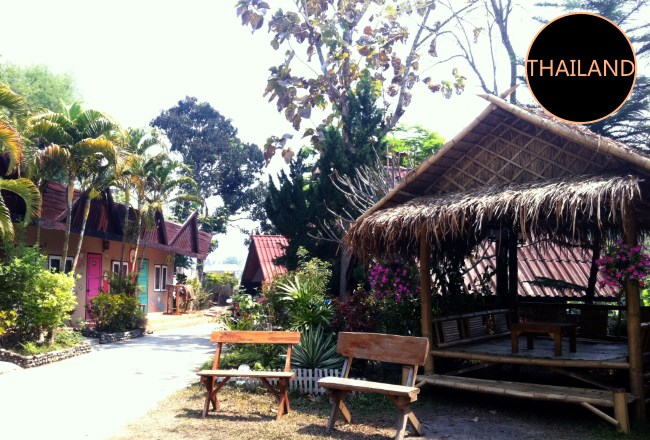From Chiang Mai to Pai

 If the sweltering chaos and debauchery of Bangkok is hell and the blissful shores of the southern islands are heaven, then the parched mountainous haze of Pai is surely purgatory.
If the sweltering chaos and debauchery of Bangkok is hell and the blissful shores of the southern islands are heaven, then the parched mountainous haze of Pai is surely purgatory.
When we arrived it was forty degrees. In the landscape around the town strategically lit fires swirled like tribal scars, seared into the brown skin of the forest. Do weather forecast websites take into account the heat coming up from the land too?
Visibility of the surrounding mountains was poor as the fires filled the air with black smoke. Once the sun went down the darkness all around made the small town centre feel like an island, an island full of hippies floating on a sea of nothingness.
Admittedly, the picture I’m painting here sounds more like hell than purgatory which is unfair. Pai is undoubtedly a lovely place and if there’s one thing your fellow travellers will tell you, whether you meet them in Bangkok, Chang Mai or one of the islands, it’s that you must go to Pai.
Once a nowhere sort of place up in the mountains in the north of Thailand, Pai made its name in the sixties, when a small cell of hippies settled there. They invited their friends, of course, created a hive and began to multiply. Curious travellers followed suit and Pai slowly became the go-to destination in Northern Thailand. Therein lies the problem. Pai is in the midst of an image crisis, it’s just not what everyone thinks it is.
Nowadays, Pai is a queer mix of young New Age, eco-warrior dread-locked types; old dread-locked white guys who’ve stuck around since the old days; 18-25 year olds from Australia and the hot parts of America looking, as always, to party; Chinese families wearing matching ‘I Love Pai’ tshirts and just regular international backpacking folk.
Pai is gorgeous, even in the parched, sweltering, sometimes aflame state I saw it in. At dusk, the sun turns orange and the misty sky around the distant mountains looks pink and purple like the whole landscape has been drawn on the pavement in chalk.
But the road to Pai is paved with good intentions. If you come to Pai hoping to find some kind of primitive settlement with tribespeople living in bamboo huts, which they will invariably invite you to share with them, then you better get on a different bus, because Pai is not that.
You can stay in a bamboo bungalow for around £4 a night and eat outside of town for less than £1, but you will be rubbing shoulders will tourists not tribespeople. In town a load of boutique hotels have sprung up, many of which have their own cafes and restaurants and swimming pools and other things that make you feel rich. A surprising number of farangs (foreigners), particularly Germans, seem to have found their forever frau in Pai, settled and started businesses. This is all perfectly lovely but the European influence on what foreigners want from their guesthouse/cafe/restaurant experience is immediately apparent and can be blamed for much of Pai’s multiple personality syndrome.
There are incredible experiences to be had in Pai if you look for them and the main pastime seemed to be speeding around the mountain paths on scooters. There are a few good second handbookshops, the night market is cute and there are cocktail and ‘high’ bars in abundance. The only way to take Pai is as it is. Enjoy the mocha frappes, the good pizza and the wifi and plan the next place you want to go.

